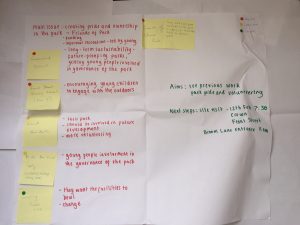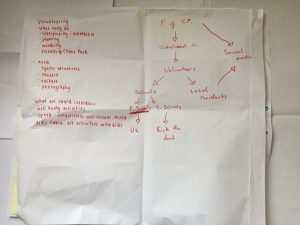

During seminar two we met with a few key stakeholders of Chase Park. Within this meeting, we got to know Clare Ross from Gateshead Council, as well as Alan Scott and Ken who are involved with Friends of Chase Park. During this session as a group, we found talking to Clare, Alan and Ken most helpful. Clare focuses on communities as well as being involved in Friends of Chase Park. Alan is one of the key founding members of Friends of Chase Park. Ken is also involved with Friends of Chase Park and is their chancellor.
During the session, we mapped out the stakeholders in order of their priority as well as discussing the main issue: creating pride and ownership in the park. Talking to Clare, Alan and Ken we came up with a list of stakeholders and prioritised them in order of influencing ability and how important they were when it came to achieving our team goal. The stakeholders with the highest priority were; Gateshead Council, Friends of Chase Park and Front Street Primary School. Those who classified as medium priority were, Local residents and Kick the Dust. Members of the bowling green were seen as low priority when it came to achieving our team goal.
At this stage in the project, our long-term goal is to provide an app or video prototype which will be aimed at young people to encourage them to use and respect Chase Park. In order to meet these goals as a group, we are going to look round Chase Park with Ken in order to give us a better idea of what we are dealing with. As a group, we will also be attending a Friends of Chase Park meeting in order to explain what our intentions are and if they have any advice or opinions on the matter. Clare and Ken are also preparing for us to go and talk to year 5 students within the local primary school. At this moment in time, it is unclear how we are going to interact with the children around the subject of Chase Park. As a group we are unlikely to interview the children as there is a large number of them. Instead, we are likely to split them into groups and get them to do an activity to produce information which will, in turn, help us to produce our prototype. By setting short term goals of going to see Chase Park, sitting in on a meeting of those involved in the Friends of Chase Park and meeting children from Front Street primary school, the hope is that we can make a prototype specific to the needs of our stakeholders.
Hello team, thanks for the post and the insights into your project’s progress. You seem to make good headway by speaking to local stakeholders and exploring the park and some of the people involved by visiting them in Whickham. The stakeholder mapping seems useful and there appears to be a focus on volunteering.
I would strongly encourage yourself to ‘dig a little deeper’ and ask yourself more critical questions. For instance, do you reckon young people might have different expectations for your project goals than those of Alan and the group (e.g. ‘park pride and volunteering’)?
I’d also encourage you to describe your project stakeholders in slightly more detail that enables you to enables you to develop empathy with their needs. For example, consider revisiting your stakeholder descriptions and develop a feeling for personas. Try to understand their journeys involved in ‘generating pride’ in the park. The mapping in terms of ‘priority’ might be a step towards that, but it remains unclear what ‘priority’ means and how those labels were created. Your maps recognise mostly group/organisation stakeholders, but what about actual user personas and local audiences, like the kids using the park? Could you give your stakeholders more ‘life’?
Onwards.
Hi team, thanks for this. Glad to hear that you got a lot from meeting Clare and the Friends. I think your approach to working with the children (which we ended up fleshing out a bit more last week) is very sensible – less interviews, and more group activities that will encourage them to think about the park and explore their relationship with it. What makes them proud to call the park their local one, if this is actually the case? Of course this isn’t a given, and I suspect you will want to find out if not, why not. In fact you could just ask them open questions around this – what does Chase Park mean to you? What do you like about Chase Park? Is there anything you do not like as much? What makes you feel proud about Chase Park / Whickham? etc. A word that sticks with me here is stewardship – ownership is important, sure, but rather than thinking about how they can possess it, how can they look after and care for this important community commons along with other residents? This kind of thing comes into “British Values” teaching which all primary school pupils have to do, so perhaps this is something you want to look into. Anyway, good work.